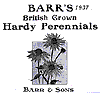Due to the uncertainity of the historical definitions of Paeonia officinalis, i.e. the fact, that many of the historical „officinalis“- cultivars are now clearly defined as forms of Paeonia peregrina (like 'Otto Froebel', 'Sunbeam' etc.), In the case of Paeonia officinalis 'Rubra Plena' and its color-variations it is more likely that these are hybrids with Paeonia peregrina as one parent.
peregrina/officinalis cultivar
Die genaue Zuordnung von Staudenpfingstrosen dieser Gruppe ist insofern problematisch, daß viele im 20. Jahrhundert als „Paeonia officinalis“-Kultivare bezeichnete Sorten eigentlich Abkömmlinge von Paeonia peregrina sind. Bis in die 1930er Jahre hießen auch die Peregrinas alle Paeonia officinalis. Ich bezweifle, daß ein Großteil dieser Gruppe irgendetwas mit Paeonia officinalis zu tun hat, angefangen bei der allseits bekannten Bauernpfingstrose „Officinalis Rubra Plena“, die entweder ein Kultivar von Paeonia peregrina ist oder (wahrscheinlicher) eine Hybride aus Paeonia peregrina und einer anderen Wildart, vielleicht Paeonia officinalis. Um dieses Zuordnungsproblem zu umgehen, hier die Gruppe „p/o“: Sorten, die im Wuchs, Blütenstellung, Laub und Farbe Paeonia peregrina ähneln bzw. Paeonia 'Officinalis Rubra Plena'. Die Zuordnung zu den Hybriden erfolgt wegen der bestehenden Unsicherheiten nicht.
A.P. Saunders: PEONY SPECIES (Other than albiflora and moutan) in: Peonies, The Manual of the American Peony Society, edited by James Boyd © 1928 American Peony Society:
P. officinalis. Southern Europe. This species has been cultivated in European gardens for centuries, and has given rise to a number of. brilliant and lovely varieties. There is much confusion regarding those which are to be traced back to P. officinalis and those derived from P. paradoxa.
Vilmorin ("Fleurs de Pleine Terre") separates two groups under these two specific names; and he states that those derived from P. paradoxa are easily distinguished by the glaucescence (bluish greenness) of the foliage. Unfortunately, Vilmorin does not include in nis list by any means all of the varieties which are, or have been, in commerce.
Since these forms when offered in nurserymen's lists are usually grouped all together under P. officinalis, I have listed them all here, making a separate group of those which, according to Vilmorin, should be referred to P. paradoxa.
A further complication arises from the fact that several varieties have been produced from P. lobata. This is itself to be considered as a variety of P. officinalis, and it is not always possible in the case of named varieties to say whether they should be referred to P. lobata or to the broader species P. officinalis.
Varieties probably referable to P.officinalis:
listed by:
alba mutabilis
alba plena
atrorubra plena
anemoneflora
blanda
carnea plena. Syn. alba mutabilis
carnescens
Ceres
Charmer
Eclair. Syn. alba mutabilis
Fire King
fulgens
incarnata plena. Syn. alba mutabilis
Lize van Veen. Sport from P. rosea superba, which has been recently introduced into commerce in Holland.
lobata : Otto Froebel, Sunbeam
maxima rosea plena
Ophia
Oriflamme
purpurea plena
rosea (single)
rosea pallida plena. Syn. alba mutabilis
rosea plena
rosea superba plena (rated 8.2 in symposium, 1925)
rubra plena (rated 8.6 in symposium, 1925)
Sabini
sanguinea plena
splendens
striata elegans
The Sultan
Kortmann (1998)
officinalis 'Alba Plena' (vóór 1907) Bloemen wit, som iets roze of karmijn gestreept, gevuld, vroeg tot zeer vroeg; hoogte 50 cm; bloemstengels matig stevig; vertakking matig. Dit is een al zeer oude, unieke cultivar. De slappe stengels zijn, zo zou men kunnen zeggen, soortgebonden. 'Alba Plena' is enigszins gevoelig voor Botrytis, maar de plant is toch niet weg te denken uit het pioenensortiment.
hybrids:
officinalis var. alba plena, pure white double. Two- to three-foot stems.
Zeppelin (2001):
'Alba Plena'. Im Erblühen zartrosa getönt, dann zu weiß verblassend, gefüllt.
officinalis ALBA PLENA (Double). Une des premières pivoines de la saison. Variété de végétation moyenne, mais fleurissant abondamment. Fleur blanche parfois striée de rosé et de carmin. H. 0,6 m.
my plant:
Tag der Pflanzung/date of planting: 19. Sept. 2000 geliefert durch / delivered by: Staudengärtner Heinz Klose Rosenstr. 10 D-34253 Lohfelden Tel. (0561) 515555 Fax. (0561) 515120
'Alba Plena' ,**,B,1-3/ 70-80,80,s. früh ,weiß,C2,Weiße Form der "Bauern-garten - Pfingstrose".
'Alba plena' : fl. double, blanc rosé transparent, 80cm
ALBA
PLENA Origine onbekend,
vóór 1907, Paeonia
officinalis
Geheel gevulde, witte bloemen met soms een
iets roze of karmijnrode zweem erdoor. Sowieso de vroegst
bloeiende echt witte pioenroos, ook wel bekend als 'de witte
boerenpioen'. Een zeer oude, unieke cultivar welke niet is weg te
denken uit het vroege assortiment. Officieuze bronnen verwijzen
naar een origine zover terug als de 17e eeuw. Geen zijknoppen en
door haar vrije groeiwijze een prachtige borderplant.
Origin unknown, before 1907, Paeonia officinalis, Full double. White flowers with occassionally pink or red flares. The earliest truely white flowering peony, also known as 'The White Memorial Day Peony'. An ancient and unique variety which is indispensable for the early flowering peony group. Unofficial sources date this variety to go back as far as the 17th century. No sidebuds and because of her free planthabit a beautiful border peony.










